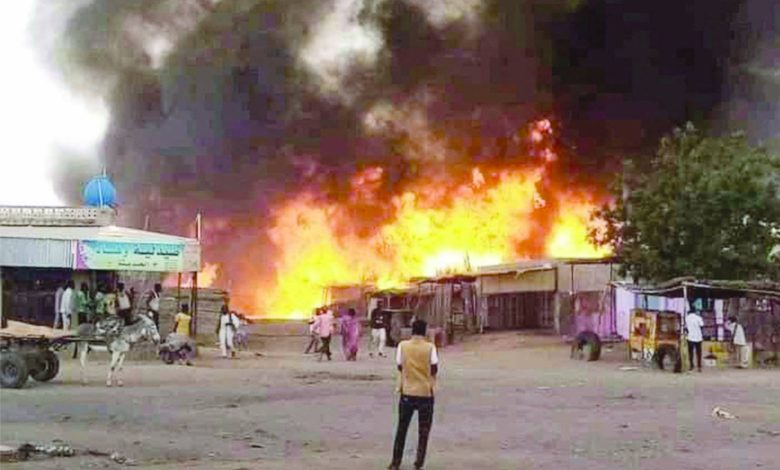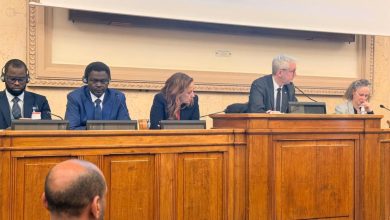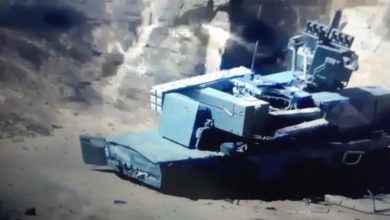Reports
Inside El Fasher, Sudan: A Besieged City Amid Civil War

Report — Citizens Source: ABC News
Yaseen, a former resident of El Fasher, told ABC News over the phone, “El Fasher was a city of refuge, a city for displaced people and a haven for refugees. It was a sanctuary; people came from different parts of Darfur. But it quickly turned into a city of misery and destruction.”
Fighting between the Sudanese Armed Forces and the Rapid Support Forces (RSF) intensified around the city as a fierce battle for control raged on—El Fasher being the last major city in Darfur under the Sudanese army’s control.
According to the UN, about 800,000 civilians were trapped in the crossfire. Yaseen—who later fled to a nearby town after an arduous journey—was one of them.
“We endured over 45 days of constant shelling and bombing. They bombed our neighborhood and the surrounding areas. Life became miserable… it’s very easy to die in El Fasher,” Yaseen told ABC News.
Last month, the months-long siege on the capital of North Darfur tightened as RSF launched a renewed assault.
Fatima, another former resident, told ABC News over the phone, “It was the most dangerous experience we’ve ever had, we barely survived.” She explained that she had sought refuge in El Fasher with her family, but is now on the move again after fleeing to a nearby town when the new RSF attack began last month.
“What adds to the pain is everything we lost. We lost so much; we lost everything we worked for. We no longer have a home, our children can’t go to school. I fear for them every day. We lost all our dreams and hopes. And now we’ve become refugees, our lives reduced to just trying to survive day by day,” she added.
“It’s the greatest sorrow we endure every day, my beloved Sudan.”
Once a major humanitarian hub and safe haven for hundreds of thousands fleeing other parts of Sudan, El Fasher now stands on the brink of collapse. Hospitals, markets, and schools have been targeted, according to international observers. ABC News has seen video footage sent from El Fasher showing the aftermath of bombings on displacement camps.
Humanitarian Research Lab analyses from Yale School of Public Health found that combat activity in El Fasher is “intense and high-frequency,” with the city having become a “free-fire zone” for both RSF and the Sudanese army. Artillery strikes from both sides, air raids from the Sudanese Armed Forces, and helicopter activity were revealed. The report warns that the pace of fighting “could reduce what’s left of El Fasher to rubble.”
The siege continues, even as famine has been confirmed in North Darfur: a Famine Review Committee found that the Zamzam refugee camp in El Fasher—which houses hundreds of thousands of displaced people—has exceeded famine thresholds.
The toll on civilians is immense. The UN has documented increasing civilian casualties due to shelling and airstrikes by both warring parties, alongside incidents of field executions, gender-based violence, and abductions. Many residents remain trapped in the city, with the UN noting that they cannot afford the high costs or the dangerous maneuvers required to escape amid the ongoing fighting.
UN High Commissioner for Human Rights Volker Türk warned: “From bitter past experience, if El Fasher falls, we believe there is a high risk of ethnic-targeted atrocities, including field executions and sexual violence by RSF and allied militias. The fighting must stop immediately. Enough.”
The RSF announced an “exceptional victory” in North Darfur on Tuesday, claiming its forces repelled an advance by “hostile factions” towards El Fasher after “intense clashes” near the Malih area, on the city’s outskirts. RSF alleges that they inflicted “heavy losses,” killing “450 enemy fighters” and capturing over 100 vehicles, along with seizing weapons and ammunition. ABC News was unable to independently verify these claims.
In a statement sent to ABC News, a spokesperson for the U.S. State Department said: “The United States condemns in the strongest terms the escalation of attacks by RSF on El Fasher, as well as the shelling of nearby displacement camps.”
The statement added: “We are equally concerned that the Sudanese Armed Forces have responded by increasing aerial bombardments in the region, further worsening the situation for the Sudanese people trapped in the city.”
“We urge RSF to halt its offensive, including targeting schools, hospitals, and markets, and to take steps to protect civilians and abide by the commitments it made in Switzerland last month and in Jeddah in May 2023,” according to the State Department spokesperson.
The war in Sudan erupted in April 2023 after months of rising tensions between Sudanese army chief Burhan and RSF leader Hemedti over the planned transition to civilian rule. The fighting began in the capital, Khartoum, before spreading across the country, with allied militias joining the battle.
The conflict has resulted in one of the “worst humanitarian crises” in recent history, forcing at least a quarter of Sudan’s population to flee their homes. As the war enters its 18th month, at least 20,000 people have been killed, according to the UN.
However, local groups warn that the real death toll may be much higher.
In his address to the UN General Assembly last Thursday, coinciding with the largest offensive by the Sudanese Armed Forces in months to reclaim control in Khartoum, Burhan said, “Sudan is facing extremely serious challenges.”
Speaking to reporters on the sidelines of the UN General Assembly in New York, the army chief—and de facto head of state—said he had evidence that the United Arab Emirates was providing arms to the powerful RSF paramilitary force.
In a statement sent to ABC News, the UAE government denied involvement in the war in Sudan: “Regarding the persistent claims by the Sudanese Armed Forces and their representatives, we have made it absolutely clear to the UN Security Council and all other international partners that the UAE is not providing any support or supplies to RSF or any of the warring parties in Sudan,” the statement read.
President Joe Biden, in a statement issued in September about the war in Sudan, said, “A violent history is repeating itself,” describing the situation in El Fasher as “a siege that has in recent days turned into a full-scale assault.”
“I call on all parties involved in the suffering of the Sudanese people—the Sudanese Armed Forces and RSF—to withdraw their forces, facilitate unhindered humanitarian access, and reengage in negotiations to end this war,” he added.



